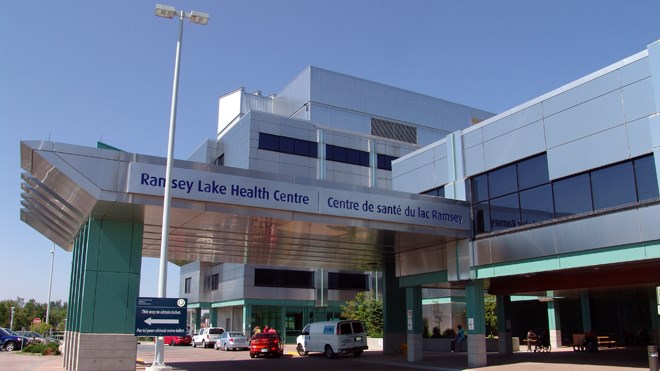The seriousness of the COVID-19 pandemic in Ontario has taken a step closer to Sudbury. Health Sciences North confirmed Monday that one seriously ill Southern Ontario COVID-19 patient is being transferred to Sudbury.
More COVID-19 patients are expected and Sudbury patients, who are not seriously sick, might be sent to other hospitals across Northern Ontario for the time being.
See: Southern Ontario COVID-19 transfer patient is from California
"We are in a tough spot provincially with active cases, hospitalizations and ICU admissions. The situation is serious and we know these trends will continue this way for the short term, which is why most hospitals have ramped down activities to redeploy staff to repurpose acute beds into critical care beds," said Dominic Giroux, the president and CEO of HSN.
"At this stage, we have received a request to accept one COVID patient from the GTA (Greater Toronto Area). That patient has not been transferred yet (3 p.m. Monday). And the Sault area hospital has also been asked to admit a COVID patient in critical care from central Ontario," Giroux said, saying he expects a number of similar requests to happen in the coming days.
Giroux said that so far, the transfers of critical care patients from the south have all been COVID-19 patients. He said the method of transportation, whether by land or air, depends on availability of transport and the location of the hospital in Southern Ontario.
Giroux also confirmed that the arrival of additional patients from the South would mean some services being ramped down at HSN.
"We are preparing for that eventuality while northern hospitals weren't excluded at this stage from the provincial surgical ramp down, HSN is supporting the provincial approach as we know the system needs to work as one."
He said HSN is responding as part of the provincial hospital network to the growing need for critical care beds that has been driven by the increase in COVID-19 cases in Southern Ontario.
"We are stepping up to the plate to do all that we can to help by extending our critical care capacity and being ready to accept ICU patients from hot spot regions when necessary," said Giroux. He outlined the local ICU numbers as being nearly three-quarters of regular capacity.
"As of today for instance, our occupancy in ICU is 73 per cent. Thirty of our 41 critical care beds have patients receiving care. We have the ability in the short-term as required to increase our ICU capacity from 41 beds to 53 beds. And should that be required then we would need to redeploy some staff. This of course would require us to ramp down some surgical and other clinical services," Giroux explained.
He added that any decision to ramp down clinical services in Sudbury would be done "in a thoughtful and prudent way". Giroux said the plans are ready to open and staff additional critical care beds, in increments of five, 10 or 15 additional beds.
"One of the measures that helps, of course we have been preparing for this for months, one of the steps we've taken as you know is to open 40 beds in Daffodil Lodge, which has created additional bed capacity in the hospital."
In addition to that, said Giroux, the province last week asked long-term care (LTC) homes throughout the province to re-open 1,500 LTC beds that were closed for various reasons back during the first wave of the pandemic.
Along with that, Giroux said all new hospital patients are being told that the potential is there they might be transferred out to another hospital, if their personal situation does not require critical care.
"So for patients from Sudbury, this could mean a transfer to a hospital in Espanola, to Manitoulin Island or Parry Sound. These hospitals regularly transfer patients to and from HSN. We have a high degree of connection to them," said Giroux. "And if patients are from another part of Northeastern Ontario, it could mean sending them back to their local hospital sooner than planned."
HSN is not alone with having to cope with changes, he said. He said hospitals across the province are facing decisions on cutting back some clinical programs in order to bolster critical care.
"There is no doubt that as we continue to see a surge in the number of critical care patients in the province, including for COVID-19, this leads all hospitals including HSN to have to redeploy staffing and potentially reduce non-critical care services.”
He said the approach is not to target any one particular medical unit at the hospital, but to target those medical professionals, physicians and nurses that have the training, the expertise and ability to practise the full scope of critical care.
"As these staff members are pulled in to staff additional critical care beds then in each of their home departments we would need to ramp down specific services," said Giroux.
Giroux said that is the current approach, but then again, that, too, could change.
"There may be a time the province will order a ramp down of all clinical services in Northern Ontario hospitals, as was done recently in Southern Ontario hospitals. But that is not the approach currently in the North," he said.
Giroux added that anyone doubting the dire situation that is in Ontario right now only has to look at the numbers.
"It is very serious. There are now more than 2,200 patients in Ontario hospitals will COVID. That number doubled since the beginning of April. It is way beyond the peak of Wave One, where there were 1,700 hospitalizations at the peak," Giroux explained.
"The situation is particularly concerning in ICUs. There are more than 750 patients with COVID patients in ICUs today. At the peak in Wave One we had only 400 patients in ICUs."
Len Gillis is a Local Journalism Initiative reporter at Sudbury.com, covering health care in Northern Ontario. The Local Journalism Initiative is funded by the federal government.



